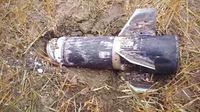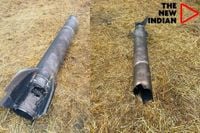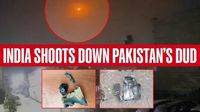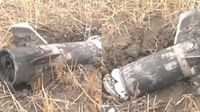Amritsar: In a dramatic escalation of tensions between India and Pakistan, India's air defense system successfully intercepted multiple missiles and drones launched from across the border early Thursday morning. This action followed precision missile strikes carried out by the Indian armed forces targeting nine terror sites in Pakistan and Pakistan-occupied Kashmir, including the notorious Jaish-e-Mohammad base in Bahawalpur.
The interceptions occurred between 1:10 AM and 1:20 AM, with loud explosions reported across several districts in Punjab, a state that shares a 532-km border with Pakistan. Debris from the intercepted projectiles was found in the fields of Jethuwal and Makhan Windi villages in the Kathunangal area of Amritsar. Residents reported hearing explosions and observing flashes in the sky, which led to a brief power outage in the region.
According to local accounts, Parkash Singh, a resident of Jethuwal, described the chaos, stating, "There was panic all around. After the explosion, a part of the missile fell in a field at Jethuwal, while debris was found scattered over houses also." Another villager, advocate Jaswinder Singh, noted, "I woke up with a start on hearing the explosion. Soon, other members of the family and relatives in the city started calling up because they had also heard the blast."
In response to the heightened security situation, the Punjab government has taken significant measures. All schools in six border districts—Ferozepur, Pathankot, Fazilka, Amritsar, Gurdaspur, and Tarn Taran—have been closed until further notice. State minister Aman Arora emphasized the importance of the Punjab government's role during times of military tension, stating, "Punjab's close border with Pakistan can make it a center of security volatility." He added that all districts near the border have been placed on high alert.
Furthermore, the Punjab police have canceled all leaves for personnel and officers, indicating that they will be on high alert to prevent any potential escalation. The police have also been instructed to monitor for rumors and assist the National Disaster Relief Force (NDRF) in case of emergencies.
The situation in the region intensified further when Pakistani troops engaged in heavy cross-border shelling along the Line of Control in the Karnah area of Kupwara district. The Pakistan Army reported that 31 people were killed and 57 others injured due to the Indian missile strikes launched shortly after midnight on May 7. Additionally, ceasefire violations by Pakistan in Jammu and Kashmir resulted in the deaths of 13 civilians in the Poonch sector, with 59 others injured, as reported by the Ministry of External Affairs.
The Indian Ministry of Defence confirmed that Pakistan attempted to strike military targets across northern and western India. In retaliation, the Indian Armed Forces conducted targeted strikes on Pakistani air defense radars and installations, including key sites in Lahore. Sources indicate that one of Pakistan's air defense systems in Lahore was successfully neutralized.
On the ground in Punjab, residents were startled by the loud explosions and the discovery of missile-like debris scattered across various locations. A senior police officer confirmed that while there were reports of explosions, there was no damage or loss of life reported in Amritsar. However, the police have been tight-lipped about the specifics, citing a change in protocol regarding communication about the incident.
As the situation unfolds, the Indian government continues to emphasize a stance of non-escalation, reiterating that any further provocations will be met with equal intensity but measured force. The U.S. Consulate General has advised American citizens in the region to shelter-in-place or leave if it is safe to do so, reflecting the escalating tensions and the potential for further conflict.
In a related incident, a drone exploded after hitting a high-tension power line in Gujarat's Khavda area near the India-Pakistan border on the night of May 7. Security agencies are on high alert as investigations into possible cross-border mischief continue.
As the Indian armed forces remain poised for further action, the residents of Punjab are left to navigate a landscape fraught with uncertainty and fear. The heightened military presence and ongoing operations have transformed the region into a focal point of conflict, leaving many to wonder what the future holds.




